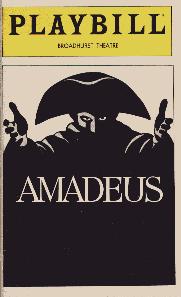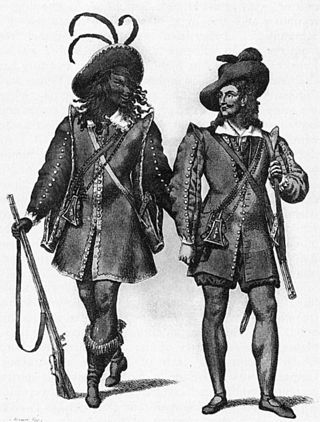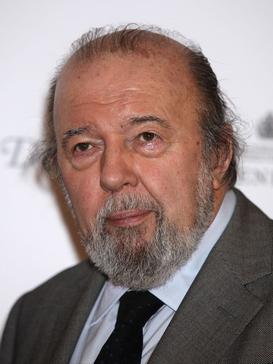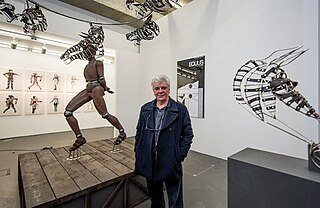
Wilhelm Richard Wagner was a German composer, theatre director, polemicist, and conductor who is chiefly known for his operas. Unlike most opera composers, Wagner wrote both the libretto and the music for each of his stage works. Initially establishing his reputation as a composer of works in the romantic vein of Carl Maria von Weber and Giacomo Meyerbeer, Wagner revolutionised opera through his concept of the Gesamtkunstwerk, by which he sought to synthesise the poetic, visual, musical and dramatic arts, with music subsidiary to drama. He described this vision in a series of essays published between 1849 and 1852. Wagner realised these ideas most fully in the first half of the four-opera cycle Der Ring des Nibelungen.

Amadeus is a play by Peter Shaffer which gives a fictional account of the lives of composers Wolfgang Amadeus Mozart and Antonio Salieri, imagining a rivalry between the two at the court of Joseph II, Holy Roman Emperor. First performed in 1979, it was inspired by Alexander Pushkin's short 1830 play Mozart and Salieri, which Nikolai Rimsky-Korsakov used in 1897 as the libretto for an opera of the same name.

Sir Peter Levin Shaffer was an English playwright, screenwriter, and novelist. He is best known for the plays Equus and Amadeus, the latter of which was adapted for the screen by Miloš Forman, with a screenplay by Shaffer, for which he won an Academy Award.

Michael Patrick Smith, known professionally as Michael Crawford, is an English actor, comedian and singer.

Simon Phillip Hugh Callow is an English actor. Known as a character actor on stage and screen, he has received numerous accolades including an Olivier Award and Screen Actors Guild Award as well as nominations for two BAFTA Awards. He was made a Commander of the Order of the British Empire (CBE) for his services to acting by Queen Elizabeth II in 1999.

Der Freischütz is a German opera with spoken dialogue in three acts by Carl Maria von Weber with a libretto by Friedrich Kind, based on a story by Johann August Apel and Friedrich Laun from their 1810 collection Gespensterbuch. It premiered on 18 June 1821 at the Schauspielhaus Berlin. It is considered the first German Romantic opera.

Sir Peter Reginald Frederick Hall CBE was an English theatre, opera and film director. His obituary in The Times declared him "the most important figure in British theatre for half a century" and on his death, a Royal National Theatre statement declared that Hall's "influence on the artistic life of Britain in the 20th century was unparalleled". In 2018, the Laurence Olivier Awards, recognising achievements in London theatre, changed the award for Best Director to the Sir Peter Hall Award for Best Director.

Rusalka, Op. 114, is an opera by Antonín Dvořák. His ninth opera (1900–1901), it became his most successful, frequenting the standard repertoire worldwide. Jaroslav Kvapil wrote the libretto on Karel Jaromír Erben's and Božena Němcová's fairy tales. The rusalka is a water sprite from Slavic mythology; it usually inhabits a lake or river.

Black Comedy is a one-act farce by Peter Shaffer, first performed in 1965. The premise of the piece is that light and dark are transposed, so that when the stage is lit the cast are supposed to be in darkness and only when the stage is dark are they supposed to be able to see each other and their surroundings.

The Symphony No. 38 in D major, K. 504, was composed by Wolfgang Amadeus Mozart in late 1786. It premiered in Prague on January 19, 1787, during Mozart's first visit to the city. Because it was first performed in Prague, it is popularly known as the Prague Symphony. Mozart's autograph thematic catalogue records 6 December 1786 as the date of completion for this composition.

Dr Evadne Hinge and Dame Hilda Bracket were characters devised by George Logan and Patrick Fyffe for their comedy and musical act. Hinge and Bracket were elderly, intellectual female musicians; in these personae, the male Logan and Fyffe played and sang songs to comic effect. They made many appearances on television and radio. The two generally performed together but, on rare occasions, appeared separately.

Antonio Maria Gasparo Gioacchino Sacchini was an Italian classical era composer, best known for his operas.

John Napier is a set designer for Broadway and London theatrical performances.
Le déserteur is a drame mélé de musique by the French composer Pierre-Alexandre Monsigny with a libretto by Michel-Jean Sedaine. It was first performed on 6 March 1769 by the Comédie-Italienne at their public theatre, the Hôtel de Bourgogne in Paris.

Les Horaces is an operatic tragédie lyrique by Antonio Salieri. The text was by Nicolas-François Guillard after Pierre Corneille's Horace.
The composer Wolfgang Amadeus Mozart (1756–1791) led a life that was dramatic in many respects, including his career as a child prodigy, his struggles to achieve personal independence and establish a career, his brushes with financial disaster, and his death in the course of attempting to complete his Requiem. Authors of fictional works have found his life a compelling source of raw material. Such works have included novels, plays, operas, and films.

The Poor Soldier is a 1783 British pasticcio opera with music by William Shield and a text by John O'Keeffe. It was a comedy set around Irish soldiers returning home after fighting in the British army in the American War of Independence, which formally ended that year with the Peace of Paris. One of the redcoats must fight for the love of Norah with the urbane Captain Fitzroy. The events are set entirely in a small Irish village called Carton, a few miles from Dublin, although several versions refer to it only as "a country village".

The Castle of Andalusia is a 1782 comic opera by Samuel Arnold and a libretto by John O'Keeffe. It was a heavily rewritten version of the 1781 work The Banditti, which had been a failure.
















